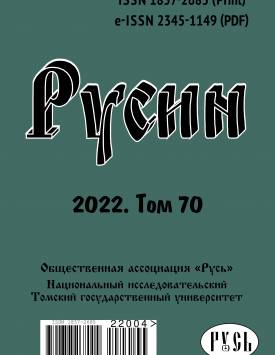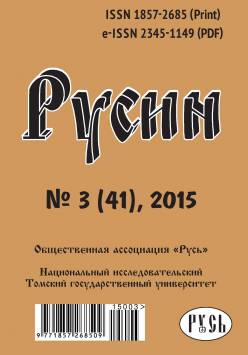Ethno-linguistic contact as reflected in language cognition: Does bilingualism affect subjective assessments of perceptual semantics?
The article analyzes the influence of the ancestral language on the perception of the second language, acquired throughout life. The study relies on the methods of experimental cognitive psycholinguistics, drawing on the theory of embodied cognition and the bilingual mental lexicon. The solution of the general theoretical problem uses early natural bilingualism, with an increasing dominance of the second language and a gradual shift of the native language to the position of the language of family heritage. This type of bilingualism is currently very common in the world, including various regions of the Russian Federation. In modern states, it is conditioned by unbalanced language functional advancement of the state language. The functionally imbalanced language situation has also developed in the regions of Southern Siberia, in the interaction between the Russian and the Khakass or Tatar languages. However, the functionally dominant state language, Russian, experiences a hidden influence of maternal languages not only on speech practices, but also on deep cognitive processes associated with the perception and cognitive processing of units of the acquired language. As the analysis has shown, the influence of the native language is manifested at the level of perception of even the deepest aspects of the semantics of the second language, which include perceptual and emotional aspects. This effects are discussed in the article in the assessments of tactile perception and emotionality given by native Russian speakers and Tatar-Russian and Khakass-Russian bilinguals in relation to the same set of lexical units. The study was carried out on the material of the psycholinguists RuTurkPsychLing database designed in the laboratory of linguistic anthropology of Tomsk State University: assessments of the words of the Russian, Tatar, and Khakass languages in terms of “familiarity”, “temperature”, “location in space”, “size”, “emotionality” and “manipulation”. The analysis has shown significant differences in the rating system, manifested both in the value of average ratings and their correlations. While the assessments of the Khakass-Russian bilinguals are closer to the assessments of native Russian speakers, the Tatar-Russian bilinguals show significant differences both in the assessments of temperature perception and its correlations with positive and negative assessments.
Keywords
bilingualism,
database,
psycholinguistic parameter of temperature,
psycholinguistic parameter of emotionality,
metaphorAuthors
| Vladimirova Valeriia E. | Tomsk State University | picture_perfect@mail.ru |
| Rezanova Zoya I. | Tomsk State University | rezanovazi@mail.ru |
| Korshunova Irina S. | Tomsk State University | korshunova-61818@mail.ru |
Всего: 3
References
Yeshurun Y., Sobel N. An odor is not worth a thousand words: From multidimensional odors to unidimensional odor objects // Annual Review of Psychology. 2010. № 61. Р. 219-241.
Winter B. Taste and smell words form an affectively loaded part of the English lexicon // Language, Cognition and Neuroscience. 2016. № 31. Р. 975-988.
Wilson M. Six views of embodied cognition // Psychonomic bulletin review. 2002. Vol. 9, № 4. Р. 625-636.
Speed L.J., Majid A. Dutch modality exclusivity norms: Simulating perceptual modality in space // Behav. Res. 2017. № 49. Р. 2204-2218.
Vasilyeva A.V., Rezanova Z.I. Cognitive Processing of Emotional Words by Russian Native Speakers and Heritage Turkic-Speaking Bilinguals // Advances in Cognitive Research, Artificial Intelligence and Neuroinformatics Proceedings of the 9th International Conference on Cognitive Sciences, Intercognsci-2020, October 10-16. Moscow, 2020. Р. 368-374.
Ponari M. et al. Processing advantage for Emotional words in bilingual speakers // Emotion. 2015. Vol. 15. Р. 644-652.
Müller N., Nagels A., Kauschke C. Metaphorical expressions originating from human senses: Psycholinguistic and affective norms for German metaphors for internal state terms (MIST database) // Behav Res. 2022. Vol. 54. Р. 365-377.
Moreno-Martínez F.J., Montoro P.R., Rodríguez-Rojo I.C. Spanish norms for age of acquisition, concept familiarity, lexical frequency, manipulability, typicality, and other variables for 820 words from 14 living/nonliving concepts // Behavior research methods. 2014. Vol. 46, № 4. Р. 1088-1097.
Miklashevsky A. Perceptual Experience Norms for 506 Russian Nouns: Modality Rating, Spatial Localization, Manipulability, Imageability and Other Variables // Journal of Psycholinguistic Research. 2018. № 47. Р. 641-661.
Meteyard L., Cuadrado S.R., Bahrami B., Vigliocco G.Coming of age: A review of embodiment and the neuroscience of semantics // Cortex. 2012. Vol. 48, № 7. Р. 788-804.
Miceli A., Wauthia E., Lefebvre L. et al. Perceptual and Interoceptive Strength Norms for 270 French Words // Front. Psychol. 2021.
Lynott D., Connell L. Modality exclusivity norms for 423 object properties // Behavior Research Methods. 2009. Vol. 41, № 2. Р 558-564. 10.3758/ BRM.41.2.558.
Lynott D., Connell L. Modality exclusivity norms for 400 nouns: The relationship between perceptual experience and surface word form // Behavior research methods. 2013. Vol. 45, № 2. Р 516-526.
Larsson M., Willander J, Karlsson K., Arshamian A. Olfactory LOVER: Behavioral and neural correlates of autobiographical odor memory // Frontiers in Psychology. 2014. № 5. Р. 1-5.
Ho H.-N., Van Doorn G.H., Kawabe T., Watanabe J., Spence C. Colour-Temperature Correspondences: When Reactions to Thermal Stimuli Are Influenced by Colour // PLoS ONE. 2014. № 9 (3). Р e91854. 10.1371/journal. pone.0091854.
Свидетельство о государственной регистрации базы данных № 2022622657 РФ. Психолингвистическая база данных RuTurkPsychLing: оценки слов русского, татарского, хакасского языков по параметрам "знакомость", "температура", "расположение в пространстве", "размер", "эмоциональность" и "манипулируемого": № 2022622423: заявл. 10.10.2022: опубл. 27.10.2022 / В.Е. Владимирова, В.С. Диброва, А.С. Душейко [и др.]; заявитель ФГАОУ ВО "Национальный исследовательский Томский государственный университет".
Резанова З.И., Степаненко А.А. Перцептивный компонент семантики имен существительных в восприятии носителей русского языка как родного и тюркско-русских билингвов (на основе психолингвистической базы данных RuWordPerception) // Вестник Томского государственного университета. 2020. № 455. С. 32-40.
Резанова З.И., Некрасова Е.Д., Миклашевский А.А. Исследование психолингвистических и когнитивных аспектов языкового контактирования в проекте "Языковое и этнокультурное разнообразие Южной Сибири в синхронии и диахронии: взаимодействие языков и культур" // Русин. 2018. № 2 (52). С. 107-117.
Резанова З.И., Миклашевский А.А. Моделирование образно-перцептивного компонента языковой семантики при помощи психолингвистической базы данных // Вестник Томского государственного университета. Филология. 2016. № 5 (43). С. 71-92.
Миклашевский A.A., Царегородцева О.В. Влияние языковых стимулов на вертикальное смещение внимания // Российский журнал когнитивной науки. 2014. Т. 1, № 1-2. С. 31-38.
Васильева А.В. Эмоциональность диминутива в ментальном лексиконе носителя русского языка как родного и тюркско-русского билингва // Вестник Томского государственного университета. 2020. № 454. С. 12-20.

